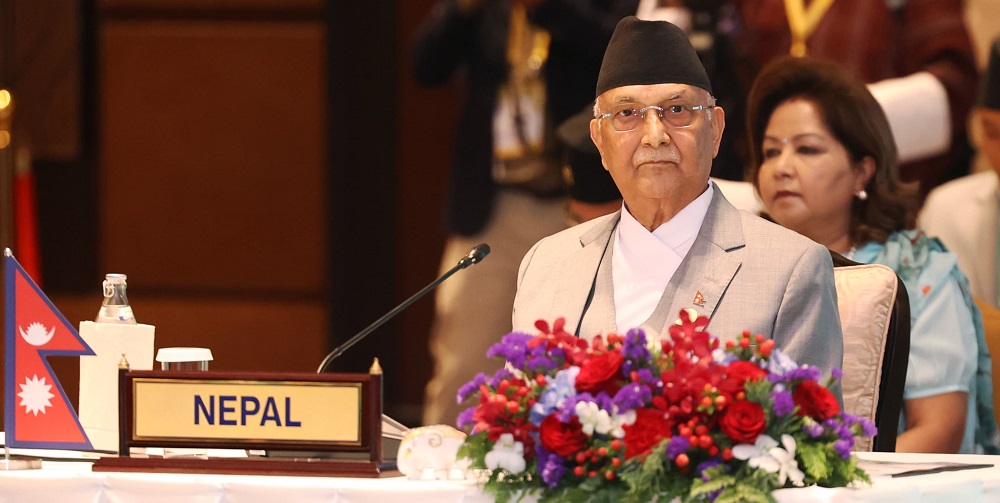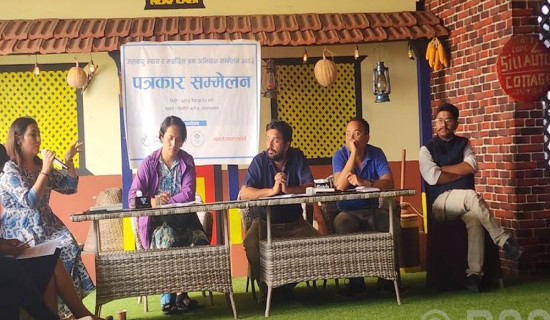- Saturday, 3 May 2025
PM Oli addresses BIMSTEC Sixth Summit
'Main theme of Summit resonate deeply with Nepal's national aspiration'
Bangkok, April 4: Prime Minister KP Sharma Oli has said the three pillars of the BIMSTEC Summit - Prosperity, Resilience and Openness - not only align with the Sustainable Development Goals, but also resonate deeply with Nepal's national aspiration of 'Prosperous Nepal, Happy Nepali'.
Addressing the BIMSTEC Summit in
Bangkok of Thailand today, Prime Minister Oli stressed that BIMSTEC must not
only navigate the changing tides but also seize the opportunity to reinvigorate
our regional cooperation.
"I believe that the theme of
the Summit –Prosperous, Resilient and Open BIMSTEC, provides us with that
compass –a compass that is pro people, pro prosperity and pro welfare," he
argued.
The Prime Minister mentioned,
"Building an integrated Bay of Bengal region is a must to unlock our
potential and capitalize on the complementarities we possess. Additionally,
recognizing that not all economies in our region are equal, we must extend
preferential support to Member States with special needs to enable them to
share common prosperity."
Saying climate change has posed an
existential threat to entire humanity, he opined that for Nepal, the stakes are
even higher. Our high Himalayas are perennial water towers and cooling stations
of Asia.
The full text of the statement
delivered by the Prime Minister in BIMSTEC Summit is as follows:
Your Excellency madam Paetongtarn
Shinawatra, the Prime Minister of the Kingdom of Thailand, and Chair of this
Summit,
Esteemed Head of delegates from
BIMSTEC Member States,
Mr. Secretary-General,
Distinguished Delegates,
Ladies and Gentlemen!
It is both a privilege and an
honour for me to address this august BIMSTEC Summit in Bangkok today.
I bring with me a message of thirty
million Nepali people for the success of this Summit and for everlasting peace,
wellbeing and prosperity of people of BIMSTEC Member States.
At the outset, I would like to
extend, on behalf of the Government and people of Nepal as well as on my own,
our sincere condolences and sympathy, to the Government and people of Myanmar
and Thailand for loss of precious lives and properties due to disastrous
earthquakes. We pray and wish for quick recovery of the injured.
At this hour of grief, Nepali
people remain in a strong solidarity with Myanmar and Thailand.
I express my profound appreciation
and gratitude to madam Prime Minister Paetongtarn Shinawatra and the Government
of Thailand for the warm hospitality and excellent arrangements made for the
Summit.
I applaud Chair Thailand for
steering BIMSTEC process with vigour and vision over past three years.
We extend our best wishes and
assure strong support to our friendly neighbour Bangladesh to lead BIMSTEC as
our next Chair.
His Excellency Secretary-General
and his team deserve our sincere appreciation for their dedicated and
professional contribution.
Excellencies, Distinguished
Delegates,
Over two decades have passed since
the seed of BIMSTEC was sown in this very city.
In these two decades we have
witnessed a profound change and transformation in the Bay of Bengal region and
beyond.
In these two decades, the Bay of
Bengal has emerged as one of the fastest growing regions in the global economic
landscape.
Yet, the challenges persist. And
quest for peace and prosperity persist.
We live in a world rife with
compounding challenges— economic disparities, environmental vulnerabilities,
and political uncertainties.
The global order is being
re-defined.
At this defining moment, BIMSTEC
must not only navigate the changing tides but also seize the opportunity to
reinvigorate our regional cooperation.
And I believe that, the theme of
the Summit –Prosperous, Resilient and Open BIMSTEC, provides us with that
compass –a compass that is pro people, pro prosperity and pro welfare.
Excellencies,
The BIMSTEC exemplifies a unique
collaboration between two dynamic regions- South Asia and Southeast Asia.
As a unique bridge, it embodies
collective aspirations of over 1.8 billion people striving for a Prosperous,
Resilient and Open BIMSTEC which is a befitting theme for this historic
Summit.
Prosperity. Resilience. Openness.
These three pillars not only align with the Sustainable Development Goals but
also resonate deeply with Nepal’s national aspiration of “Prosperous Nepal,
Happy Nepali.”
Today’s theme is not just a slogan,
but a call to action.
These three priorities will shape
our path ahead.
While the region shows an
impressive growth, many people are confronting the common enemy of
poverty.
In such a context, prosperity is
not an option; it is an obligation.
The BIMSTEC region is richly
endowed with natural resources, cultural diversity, and a youthful
workforce.
From the majestic Himalayas to the
Bay of Bengal's vibrant coastlines, we are blessed with abundant
potential.
Given the immense potential of the
region, prosperity is not a mere wishful thinking; it is an achievable
destiny.
But to arrive at destiny—we must
harness it strategically; we must unlock it sustainably.
Investing in human capital is
non-negotiable. The Fourth BIMSTEC Summit in Kathmandu emphasized the
importance of regional cooperation in education, skills development, and
capacity-building.
Regional connectivity is an
important pillar in our quest for prosperity.
Connectivity of markets as well as
minds, connectivity of infrastructures as well as ideas, connectivity of
culture as well as cyber is yet another backbone of growth.
Implementation of BIMSTEC Master
Plan for Transport Connectivity and BIMSTEC Agreement on Maritime Transport
Cooperation in a time-bound manner will bring about significant progress in
this regard.
It is concerning that
intra-regional trade in BIMSTEC remains a mere 5%—far lower than ASEAN, EU, or
NAFTA.
Our region is among the least
integrated globally, barring natural interconnections among our societies,
economies and nations.
This must change.
Building an integrated Bay of
Bengal region is a must to unlock our potential and capitalize on the
complementarities we possess.
Additionally, recognizing that not
all economies in our region are equal, we must extend preferential support to
Member States with special needs to enable them to share common
prosperity.
Distinguished Delegates,
Today, the world is at a
crossroad.
Over the recent years, we have seen
uncertainties stemming from multiple domains ranging from ecology to economy;
from trade tensions to technological disruptions; from changing climate to
conflicts; from pangs of pandemics to perils of polarization;
In such an uncertain world,
resilience is our strongest defence.
In such a world of worries,
resilience is our antidote against despair.
In such a world of ‘black swans’,
resilience is our road to robustness.
Excellencies,
Climate change has posed an
existential threat to entire humanity.
For Nepal, the stakes are even
higher. Our high Himalayas are perennial water towers and cooling stations of
Asia.
While these high mountains
contribute as global heat sinks, they have also suffered a disproportionate
assault despite our negligible emissions. Further, the impact is confined not
only in mountains but also in the downstream lowlands and coastal areas.
To highlight the plight of
mountains and linkages between mountains and oceans, Nepal is organizing the
first edition of Sagarmatha Sambaad this May and I look forward to see many of
you there.
Across the region, sea levels are
rising, and tropical storms in coastal regions are becoming more intense.
Indeed, the BIMSTEC region faces a wide range of extreme weather events—
glacial floods, tropical cyclones, thunderstorms, heat waves, and droughts.
These challenges are not distant
threats; they are damaging our everyday life.
It is imperative that we act
decisively to safeguard our people and our future.
It is imperative that we adopt a
“whole of the region” and “whole of the world” approach to jointly undertake
bold climate action.
In a similar vein, we must deepen
regional energy cooperation by investing in cross-border energy grids and
renewable energy projects, particularly hydropower.
In addition, we must also build
resilience against rising trade tensions, supply chain disruptions, and rapid
technological shifts.
And such resilience can be achieved
through domestic readiness combined with regional cooperation.
Disaster preparedness, public
health resilience and inclusive economic policies must remain at the heart of
our regional agenda.
Social and cultural harmony must be
promoted, and a strong sense of community must be fostered.
A just, inclusive, and
people-centric development must be achieved by integrating the SDGs with
national and regional policy frameworks.
Excellencies,
For a vibrant and dynamic BIMSTEC,
openness is the foundational bedrock.
A comprehensive democracy –which
holistically addresses political, economic, ecological and cultural concerns,
is essential for long-term stability.
We must strengthen people-to-people
connectivity through sustainable tourism, cultural exchanges, educational
linkages, and cross-border investments.
A visa-on-arrival policy within
BIMSTEC would be a game-changer in easing travel and fostering deeper regional
bonds.
We must prioritize digital
integration to facilitate e-commerce, cross-border payments, and
e-governance.
Lastly, we must prioritize research
and development to drive innovation and address shared challenges—from climate
change to food security to technology-driven economic transformation.
Excellencies,
The BIMSTEC Bangkok Vision 2030,
which we are adopting today, serves as a blueprint for our shared future.
It is our collective responsibility
to ensure that no BIMSTEC nation is left behind.
Nepal remains deeply committed to
the BIMSTEC Charter and the principles it upholds. We take immense pride in
leading the People-to-People Contact Sector and look forward to deepening
partnerships across priority areas.
As we stand at a historic
crossroads, let us reaffirm our unwavering commitment to transforming the Bay
of Bengal into a Prosperous, Resilient, and Open region.
When the world order is in
flux:
our strength lies in unity,
and
our future shines in solidarity and
deeper collaboration.
We are in a race against time. The
future belongs to those who act with urgency and vision.
Let me conclude with wise words of
the enlightened son of Nepal Lord Buddha.
“However many holy words you read,
however many you speak, what good will they do you if you do not act upon
them?”
Therefore:
Let us act on our words to build a
BIMSTEC that delivers—for our people, and for generations to come.
Let us act on our words to
transform the region into a dynamic hub of prosperity, resilience and
openness. (RSS)












-original-thumb.jpg)
(2)copy-(1)-original-thumb.jpg)
